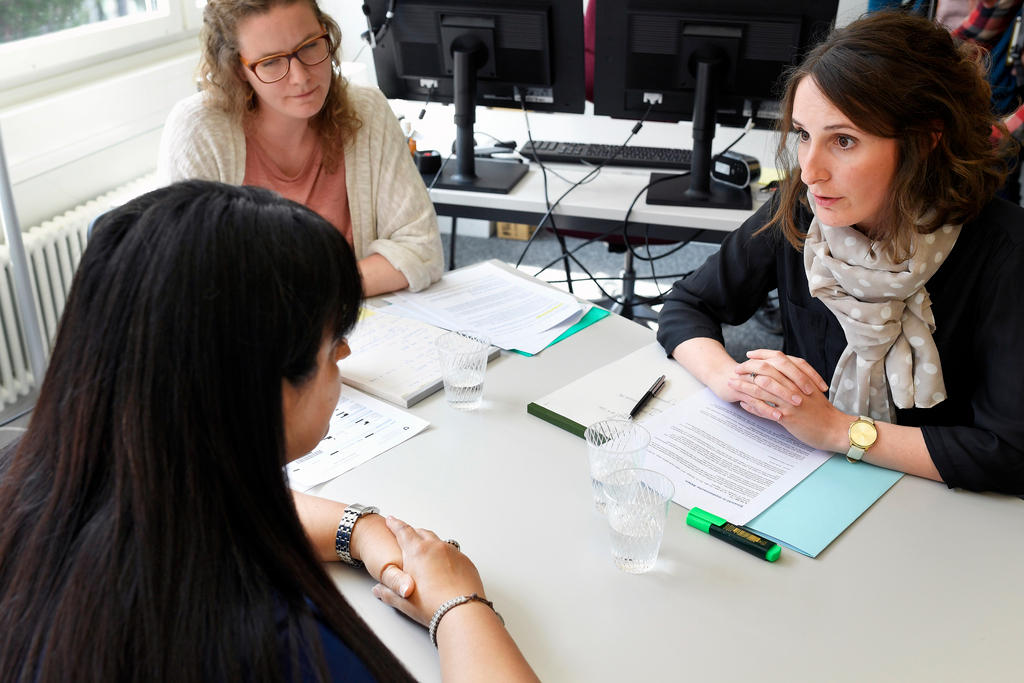
Is this the future of handling asylum requests?

Voters will shortly decide on whether to speed up asylum procedures in Switzerland – reforms based on a pilot project in Zurich. Officials argue the new system, which includes free legal representation, would be faster and fairer. But not everyone agrees.
The pilot projectExternal link for fast-track asylum procedures in Switzerland has been running at a location in Zurich’s off-beat western quarter since 2014. On Wednesday it threw open its doors to journalists to offer a glimpse of what the asylum procedure would be like in Switzerland, should voters accept the reforms to the asylum law on June 5.
The idea, says Barbara Büschi, deputy director of the State Secretariat for Migration (SEM)External link, is that Switzerland gains a well-organised asylum system in which those who need protection are helped and those who don’t, leave Switzerland quickly.
“This is particularly important in times of higher asylum requests,” she told reporters. On Wednesday it was announced separatelyExternal link that the government would boost staff numbers at the State Secretariat for Migration due to the migration crisis.
The SEM estimates that CHF200 million ($204 million) a year could also be saved in the medium term under the new procedure.
How it works
So how does this work in practice? After a security check on day one, a full set of digital fingerprints is taken the next day. The Eurodac database is consulted to see if asylum has been applied for in another country in the Dublin agreement – which states that asylum applications must be handled by the country where a refugee first arrives – prior to coming to Switzerland.
Documents and backgrounds are checked: particularly relevant at the moment, an official said, are links to terrorism.

In a third step, the applicant is sent to what’s called the “asylum legal support” section. This is run by the non-profit Bern Legal Advice Centre for People in NeedExternal link. Lawyers accompany applicants through the whole process.
By day 7-10, applicants can expect a several-hour interview on the background and their motivation for wanting asylum in Switzerland. Staff at the Zurich asylum centre stepped into the various roles involved in the process – applicant, interpreter, lawyer and migration officials – to show journalists two different fictional examples.
Two “cases”
In one, an “Algerian lady” had obtained a visa from the Swedish embassy to come to Switzerland. She had been living with an uncle in Geneva. In another scene, a “Syrian man”, who said he was persecuted by the Assad regime, was carefully questioned about his participation in protests, and threats he had received.
Decisions are then made quickly. The lady wasn’t able to stay in Switzerland because under Dublin rules, Sweden was responsible for her application. The Syrian man would have gained asylum, officials said.
After that, appeals can be made. Preparations are made for unsuccessful applicants to leave Switzerland.
The whole process should take around 140 days – down from an average of 700 days under the current standard process.
“We are like their lawyers without really being so”
Currently legal representation of asylum seekers is partly taken on by observers from non- governmental organisations. swissinfo.ch spoke to Theodore Adote, an observer from Swiss Church Aid, who works with asylum seekers in Bern. He was speaking in a personal capacity.
Adote says in Bern they deal with asylum cases that fall wholly under Swiss jurisdiction, so non-Dublin cases. These need a detailed examination of the facts and motivations for requesting asylum. These federal hearings involve an employee of the State Secretariat for Migration, translator, a minutes clerk and an independent observer (a requirement by law). They can last 2-3 hours or up to a day.
The observer makes sure that the asylum seeker “can express him or herself freely and is not placed under pressure. We are a bit like their lawyers without really being so.” They can intervene if needed and submit a report signed by the asylum seeker if they think the hearing was not conducted correctly. It’s normally clear if the asylum seeker’s story is or is not true, says Adote. About 20% of cases in Bern fall into a “grey area”. A panel of judges has to decide in complicated cases.
Observers have no contact with asylum seekers after the hearing. Cantonal legal services can be contacted in case of appeals. If the June 5 vote is passed, observers will be replaced by lawyers who will accompany the asylum seekers through the whole process, a move which Adote welcomes. “This legal protection should, among other things, also reduce the risk of an asylum seekers going into his or her hearing unprepared,” he said. This is even more important given that the new law aims to speed up the asylum process, added the observer.
The fast-track asylum procedure in Zurich was recently given a glowing report: asylum process times were reduced by 39%; there were fewer appeals (17.1% compared with 25.4% under the old system), and there was a higher percentage of people voluntarily returning home.
There has been large international interest in the system as well, SEM deputy director Büschi told swissinfo.ch. Switzerland’s own system is based on a similar procedure in the Netherlands.
Criticisms
But the conservative right Swiss People’s Party, which has forced the vote on the fast-track reforms, argues that the new system makes Switzerland more attractive to asylum seekers, not less.
Büschi rejects this. “This reform will mean a more rigorous, credible and constitutionally correct asylum procedure and overall the Swiss population will benefit more from the asylum system because it is decided sooner who leaves and who stays. And those who stay can be integrated earlier,” she argued.
One criticism is the fact that around 30% of asylum seekers disappeared during the test phaseExternal link covered in the report, a fact that the SEM does not dispute. This is most likely because it is clear early on that they will not be successful, reports say. The SEM says most went to try for asylum in a neighbouring country.
The People’s Party also objects to the free lawyers. But Dominique Wetli, the legal team leader, says that they are essential.
“Legal representation can help significantly to make sure that the procedure really is fair and that asylum seekers don’t become victims of the speed of the procedure,” he told swissinfo.ch.
So what happens if people vote ‘no’ on June 5? The test phase in Zurich will eventually be stopped, Büschi said. “And we will keep working with the old asylum law,” she added.
Newspaper accusations
On Tuesday the Tages-Anzeiger ran an article based on anonymous sources, that alleged that SEM employees were not treating asylum seekers with enough respect during interviews in some government asylum centres, shouting at them and accusing them of lying.
Martin Reichlin, SEM spokesman, told swissinfo.ch that the SEM had taken note of this criticism but emphasised that anybody working for the SEM, also externally as an interpreter or from an NGO, could come to the SEM with their criticism. “There have been cases when employees have perhaps found a situation too demanding and have not been appropriate. We need the information to resolve the situation. Anonymous accusations don’t help us.”
If the information firms up, talks will be held with the relevant people. “It not right that people who are looking for protection in Switzerland are not dealt with respectfully. It’s the aim of the asylum procedure that it is carried out respectfully,” Reichlin said.

In compliance with the JTI standards
More: SWI swissinfo.ch certified by the Journalism Trust Initiative
































You can find an overview of ongoing debates with our journalists here . Please join us!
If you want to start a conversation about a topic raised in this article or want to report factual errors, email us at english@swissinfo.ch.